Gerd Müller
Gerd Müller is undoubtedly one of the best strikers in history. He is one of the best finishers of all time, few have a goal/match ratio close to his.
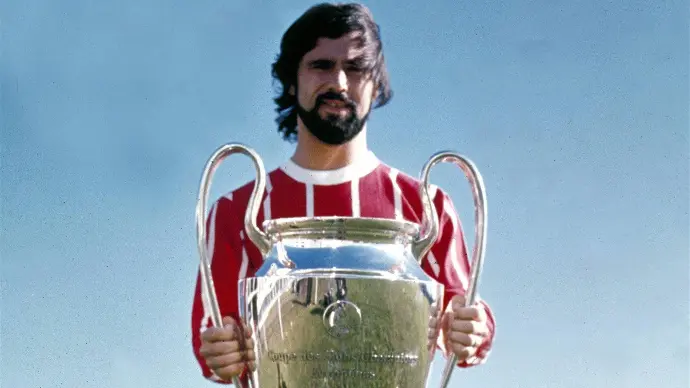
Games
Goals
Assists
Trophies
1963/64 TSV 1861 Nordlingen (GER) 31 games, 51 goals
(3rd Division Championship: 31 games, 51 goals)
1964/79 Bayern Munich (GER) 615 games, 567 goals
(German Championship: 427 games, 365 goals)
(Regionalliga Süd: 26 games, 33 goals)
(Promotion Play-off: 6 games, 6 goals)
(Reserve Team Championship: 3 games, 2 goals)
(German Cup: 64 games, 80 goals)
(German League Cup: 5 games, 12 goals)
(European Champion Clubs' Cup: 35 games, 35 goals)
(UEFA Cup Winners' Cup: 25 games, 20 goals)
(UEFA Cup/Inter-Cities Fairs Cup: 14 games, 4 goals)
(UEFA Super Cup: 3 games, 3 goals)
(Intercontinental Cup: 1 game, 2 goals)
(Intertoto Cup: 6 games, 5 goals)
1979/81 Fort Lauderdale Strikers (USA) 80 games, 40 goals
(NASL: 71 games, 38 goals)
(Play-offs: 9 games, 2 goals)
With the National Team :
62 caps, 68 goals
(Friendly matches: 31 caps, 29 goals)
(World Cup qualifiers: 6 caps, 9 goals)
(World Cup: 13 caps, 14 goals)
(Euro qualifiers: 10 caps, 12 goals)
Euro: 2 caps, 4 goals)
1st cap: October 12, 1966 against Turkey (2-0)
Last cap: July 7, 1974 against the Netherlands (2-1)
U21: 1 cap, 1 goal
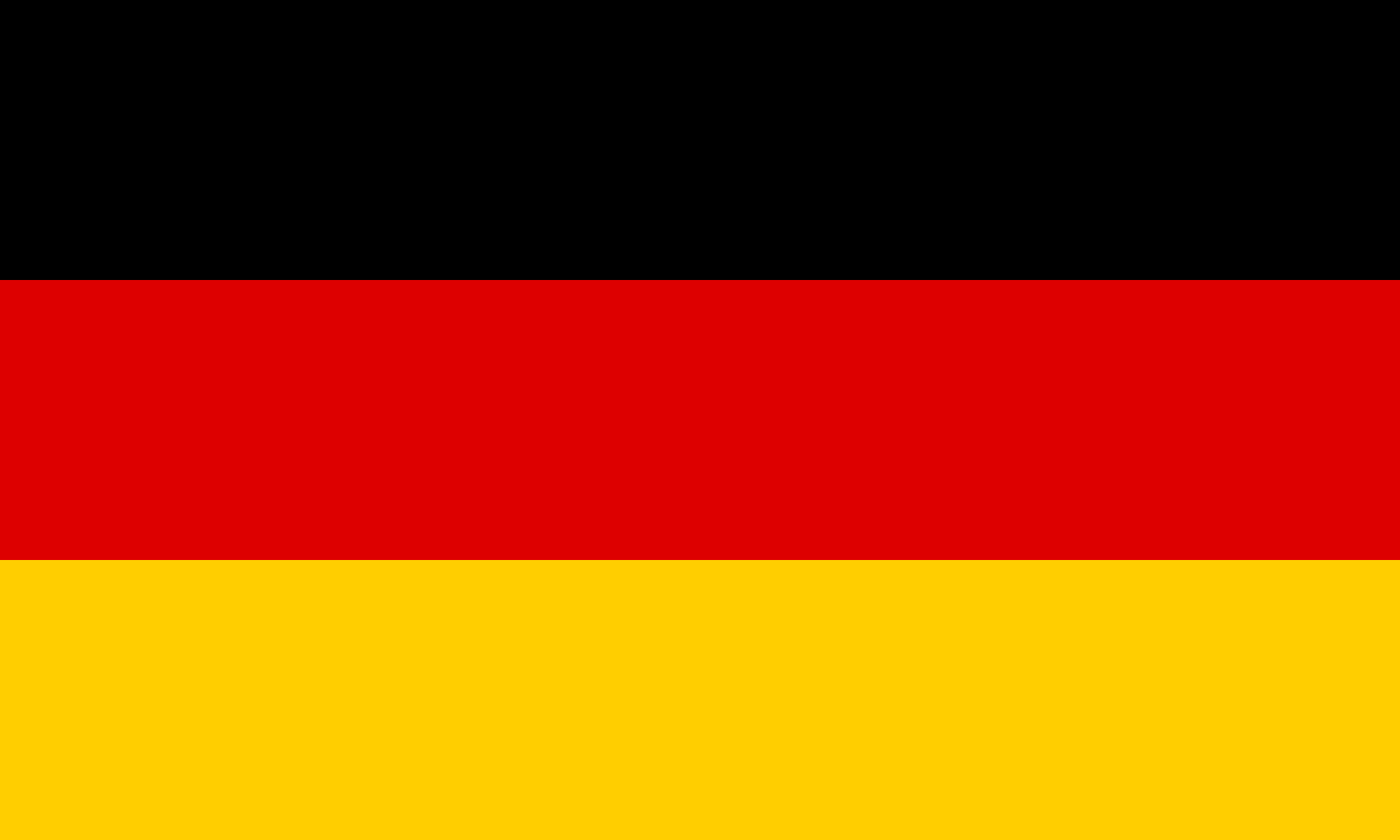
Gerhard Müller
Born on November 3, 1945 in Nördlingen (GER)
Died on August 15, 2021 in Wolfratshausen (GER)
German, Striker, 1m76
Nicknames: Der Bomber, Kleines dickes Muller
The striker who gave Bayern Munich a name
Gerd Müller was born on November 3, 1945 in Nördlingen, Germany. Having played for the youth teams of his hometown, he played at 18 for the first team of TSV 1861 Nordlingen, where he made his mark by scoring 51 goals in just 31 games. He was then recruited by the ambitious Bayern Munich club in 1964.
He then made his debut in the Regionalliga Süd at the age of 19, for his first game against FC Freiburg, he scored twice and already showed great qualities. With Müller, the then modest German club would gradually become one of the best in Europe, thanks in particular to its local players such as Franz Beckenbauer and Sepp Maier.
The legendary trio of Bayern Munich would snatch promotion to the Bundesliga in 1965, once in the elite of German football, the club finished in 3rd place in the championship and would win the German Cup. With Gerd Müller scoring 80 goals in 64 games during his career, Bayern won the German Cup again in 1967, 1969 and 1971.
Gerd Müller continued to progress and won the Cup Winners' Cup in 1967, voted best German footballer at the end of the season, he already proved himself to be one of the best strikers in the world. He also won the German championship 4 times, in 1969, 1972, 1973 and 1974.
Gerd Müller was the finishing touch to the Bavarian offensives and never stopped scoring, he allowed Bayern to win 3 consecutive Champions Leagues in 1974, 1975 and 1976. At the same time, he finished top scorer in the competition in 1973 with 12 goals, 1974 with 8 goals, 1975 with 5 goals and 1977 with 5 goals.
A complete and decisive attacker
Gerd Müller was then the best finisher in the world, a surgical striker in big matches, in all matches. He was an explosive, fast and technical striker who stood out for his extremely powerful and thick thighs. With an extraordinary flair and sense of goal, he always managed to slip through the defense, recover a cross from his teammates and score with his head or feet.
At 1m76 and with his stocky physique, he was a real rock, able to withstand the physical blows of opposing defenders. He could score in any position and in any way. The one who would become "Der Bomber" became one of the most effective strikers of all time. In total, he scored 365 goals in 427 Bundesliga matches.
The 1970 World Cup and the Ballon d'Or
In addition to an exceptional club career, the German striker will have an incredible story with the West German national team. He made his debut on October 10, 1966, in a match won 2-0 against Turkey. Performing well, he almost immediately established himself as his country's star striker.
It was during the 1970 World Cup that the player exploded in the eyes of the entire world, associated with Uwe Seeler, he scored 10 goals during the tournament, during the semi-final, he scored a legendary double. His tournament is considered one of the best of all time:
In the group stage:
- Against Morocco: 1 goal, 1 assist, 82% of successful passes, 4 key passes and 1 interception
- Against Bulgaria: 3 goals, 1 assist, 84% of successful passes, 2 key passes,
- Against Peru: 3 goals, 93% of successful passes, 1 key pass and 1 interception
In the quarter-finals:
- Against England: 1 goal, 85% of successful passes and 3 key passes
In the semi-finals:
- Against Italy: 2 goals, 81% of successful passes and 3 key passes despite West Germany's 4-3 defeat.
In the third-place play-off:
- Against Uruguay: 1 assist, 86% of successful passes, 1 key pass and 3 interceptions
This performance worthy of the greatest allowed him to win the 1970 Ballon d'Or, where he beat Bobby Moore and Luigi Riva.
An absolute legend of German football
In 1972, he participated in and won the Euro, where he played 2 matches and scored 4 goals. He also finished as the competition's top scorer. His 1971/72 season was crazy, he scored 40 goals in the Bundesliga, and scored a total of 85 goals in 60 matches in all competitions in the calendar year 1972, the record at the time in Europe in a major championship.
In 1974, he won the World Cup and established himself among the best players of all time, scoring 14 goals in 13 World Cup games, adding 6 assists, one of the best ratios in the history of the competition. After this successful tournament, he ended his international career at just 28 years old, rumoured to have been furious that the players' wives were not invited to the banquet celebrating West Germany's victory. His decision to retire from the national team was thus made on a whim. Later, he would come back to the rumour saying: "Three days before the final, I told Schön that I was quitting. He asked me not to say anything until the final. That's it. There's nothing more."
In 1979, he decided to leave Bayern Munich as it was in decline, he then tried the experience of playing football in the USA, in the club Fort Lauderdale Strikers. He played there for 2 years before hanging up his boots when he was 35 years old.
Trophies :
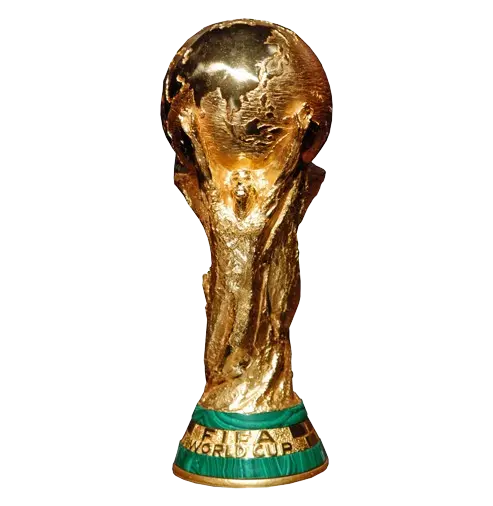
World Cup x1
- 1974 (West Germany)

3rd at World Cup x1
- 1970 (West Germany)
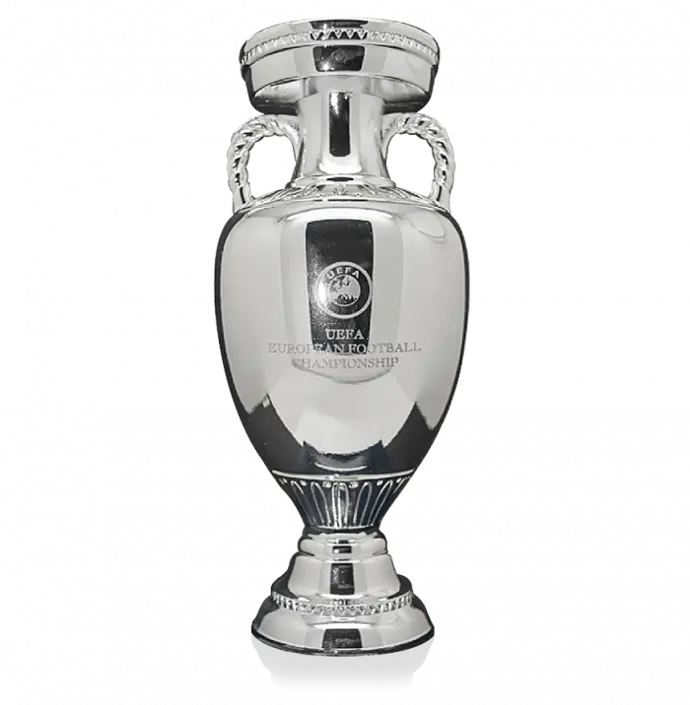
Euro x1
- 1972 (West Germany)
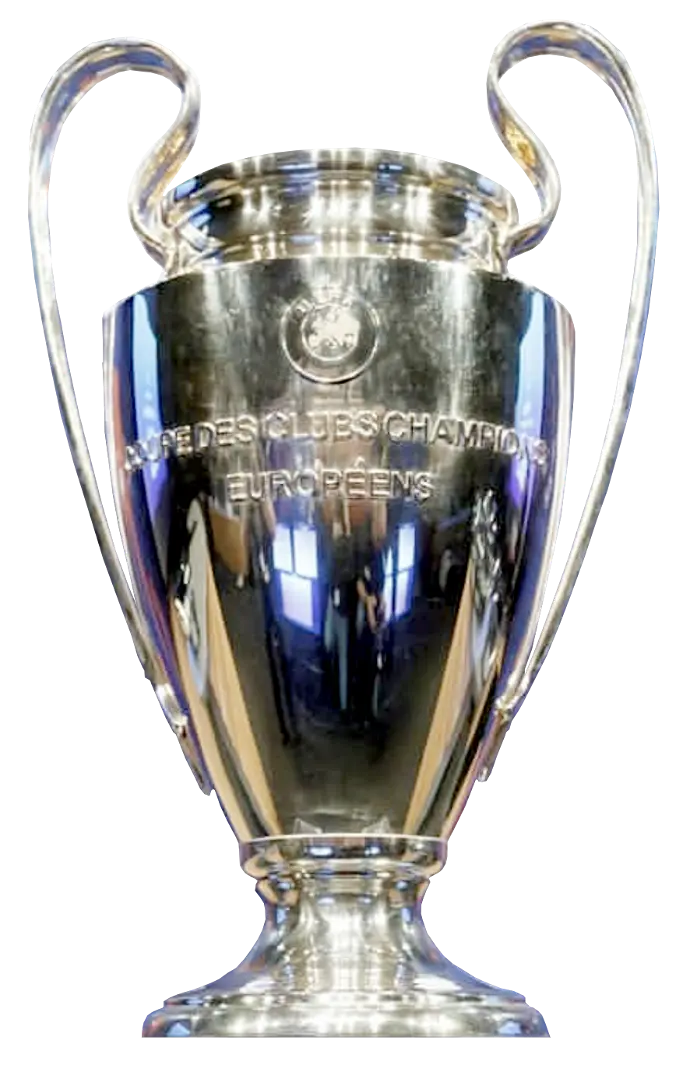
Champions League x3
- 1974 (Bayern Munich)
- 1975 (Bayern Munich)
- 1976 (Bayern Munich)
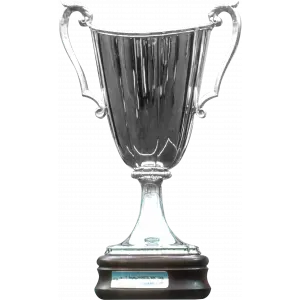
Cup Winners Cup x1
- 1967 (Bayern Munich)
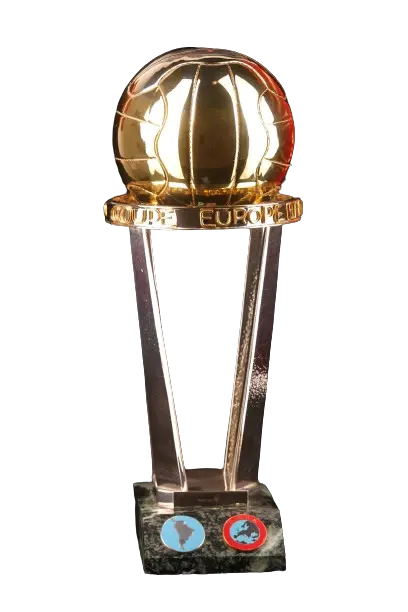
Intercontinental Cup x1
- 1976 (Bayern Munich)
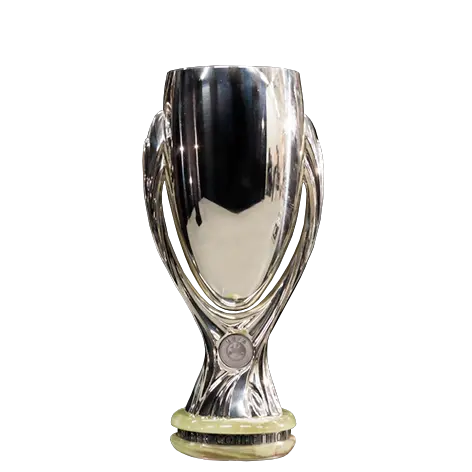
Finalist UEFA Supercup x2
- 1975 (Bayern Munich)
- 1976 (Bayern Munich)
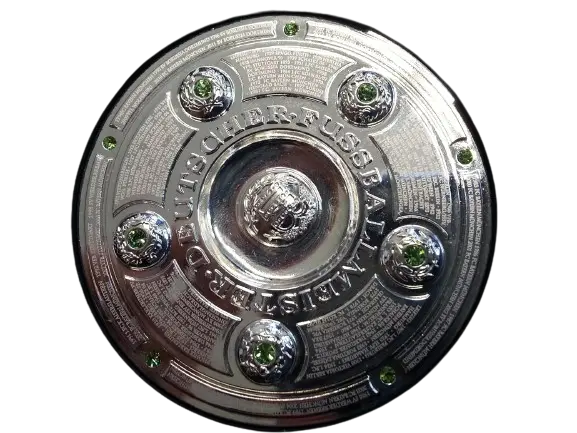
Bundesliga x4
- 1969 (Bayern Munich)
- 1972 (Bayern Munich)
- 1973 (Bayern Munich)
- 1974 (Bayern Munich)

Vice-Champion Bundesliga x2
- 1970 (Bayern Munich)
- 1971 (Bayern Munich)
Regionalliga Süd x1
- 1965 (Bayern Munich)
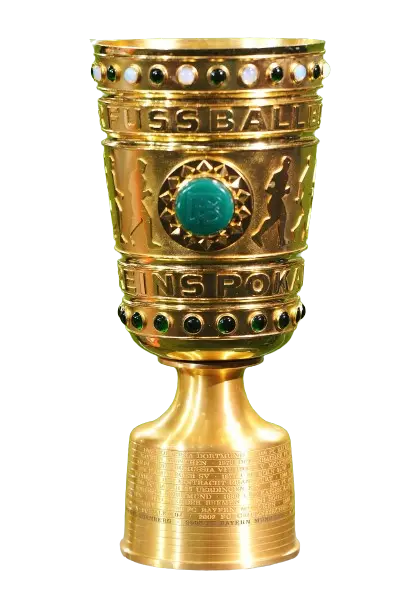
German Cup x4
- 1966 (Bayern Munich)
- 1967 (Bayern Munich)
- 1969 (Bayern Munich)
- 1971 (Bayern Munich)
Individual Trophies :
- Golden Ball in 1970
- Voted best German footballer of the year in 1967 and 1969
- European Golden Shoe in 1970 (38 goals) and 1972 (40 goals)
- European Silver Shoe in 1973 (36 goals)
- European Bronze Shoe in 1974 (30 goals)
- Top scorer of the World Cup in 1970 (10 goals)
- Top scorer of the Euro in 1972 (4 goals)
- Top scorer of the Champions League in 1973 (12 goals), 1974 (8 goals), 1975 (5 goals) and 1977 (5 goals) (Bayern Munich)
- Top scorer of the German championship in 1967 (28 goals), 1969 (30 goals), 1970 (38 goals), 1972 (40 goals), 1973 (36 goals), 1974 (30 goals) and 1978 (24 goals) (Bayern Munich)
- Voted forward of the year by the German magazine "Kicker" in 1976
- Named to the 1970 World Cup tournament team of the year
- Named to the 1972 Euro tournament team of the year
- Named to the FIFA 100
- Received the FIFA Order of Merit in 1998
- Order of Merit of the Federal Republic of Germany in 1977
- Voted among the "legends" of football by Golden Foot in 2007
- Received the Silbernes Lorbeerblatt medal in 1967
- Received the Bravo Otto Award for the best sportsman of the year in 1973 and 1974
- Ambassador of the 2006 World Cup in Germany for the city of Munich